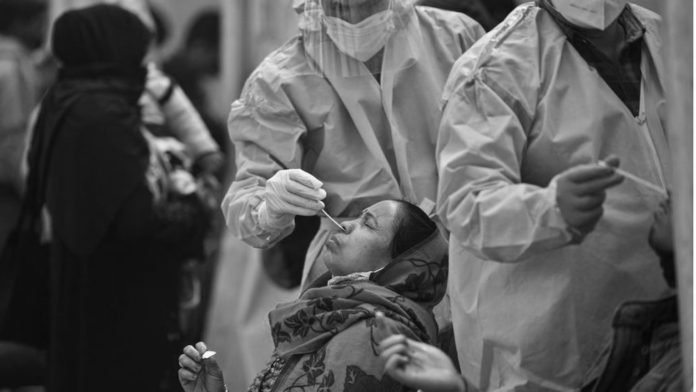India reported 2.47 lakh coronavirus cases today, the highest single-day rise in the ongoing wave. The country’s tally now stands at 3.63 crore, which includes 5,488 cases of Omicron variant reported across 28 states and union territories.
The active cases comprise 3.08 per cent of the total infections, while the national COVID-19 recovery rate has decreased to 95.59 per cent. An increase of 84,825 cases has been recorded in the active COVID-19 caseload in a span of 24 hours, according to the Health Ministry data updated this morning.
The daily positivity rate was recorded at 13.11 per cent while the weekly positivity rate was recorded at 10.80 per cent. The cumulative doses administered in the country so far under the nationwide vaccination drive has exceeded 154.61 crore, the ministry said.
As many as 380 people have died of Covid during the past 24-hour period, according to the Health Ministry. This includes 199 deaths in Kerala in the last few months, added based on pending appeals after the last Supreme Court guidelines.
Maharashtra, one of the worst-hit states by the Covid pandemic, added 46,723 new COVID-19 cases, up more than 27 per cent from a day ago, taking the overall tally above the 70-lakh mark. The new cases included 86 infections of the highly contagious Omicron strain, pushing their cumulative count in the state to 1,367, according to the state health department.
Delhi reported 27,561 fresh Covid cases, which is a 29 per cent rise over the cases in the last 24 hours and the most number of cases in a day since April. The positivity rate has touched 26 per cent, which is the highest in seven months.
New cases in Kerala crossed 10,000-mark for the first time after three months as the state reported 12,742 infections on Wednesday. Twenty-three virus-related deaths were also reported during the period. State Health Minister has said that the cases are primarily Delta as of now.
Prime Minister Narendra Modi will interact with chief ministers over the Covid situation today. This is the second review meeting by the prime minister with a week. On Sunday, PM Modi had called for ensuring adequate health infrastructure at the district level and accelerating the vaccination drive for adolescents in mission mode.
The Centre on Wednesday said lateral flow tests, which include rapid-antigen and home-antigen tests, can detect Covid from the third day after exposure to the virus today eight while the RT-PCR test can diagnose the infection for up to 20 days. At a press conference, the Indian Council of Medical Research (ICMR) Director-General Dr Balram Bhargava said on the first day one will test negative whatever tests they undertake.
Omicron is not a common cold and it is a misconception that is spreading, the government’s top Covid adviser VK Paul said Wednesday, a day after the country’s top epidemiologist called Omicron infections as mild as a cold and said everybody would likely catch it.
Covid cases have been on the rise since late last year due to the fast-spreading Omicron variant, first identified in Botswana and South Africa. The total number of Covid-19 registered worldwide since the start of the pandemic topped 300 million on Friday, according to an AFP count based on official figures.
More about Omicron
The Omicron variant has been called a variant of concern by WHO based on studies that shows it has several mutations.
Still a lot of research is underway to evaluate its transmissibility, severity and reinfection risk.
The Omicron variant has been detected in several regions of the world. WHO reports that the likelihood of the Omicron variant spreading further globally is high.
It is not currently known if the Omicron variant is more or less severe than other strains of COVID-19, including Delta. Studies are ongoing and this information will be updated as it becomes available.
It is not yet clear whether Omicron can spread more easily from person to person compared to other variants, such as Delta.
However, being vaccinated and taking precautions such as avoiding crowded spaces, keeping your distance from others and wearing a mask are critical in helping to prevent the spread of COVID-19, and we know these actions have been effective against other variants.
Researchers are looking into any potential impact the Omicron variant has on the effectiveness of COVID-19 vaccines. Although information is still limited, WHO believes it is a reasonable assumption that the currently available vaccines offer some protection against severe disease and death.
It is also important to be vaccinated to protect against the other widely circulating variants, such as the Delta one. When it’s your turn, make sure to get vaccinated. If your vaccination involves two doses, it’s important to receive both in order to have the maximum protection.
According to WHO, early evidence suggests that people who have previously had COVID-19 could be reinfected more easily with Omicron, in comparison to other variants of concern. Information is still limited though and we will share updates as it becomes available.
Source: UNICEFRead more Health News
Latest update Omicron

